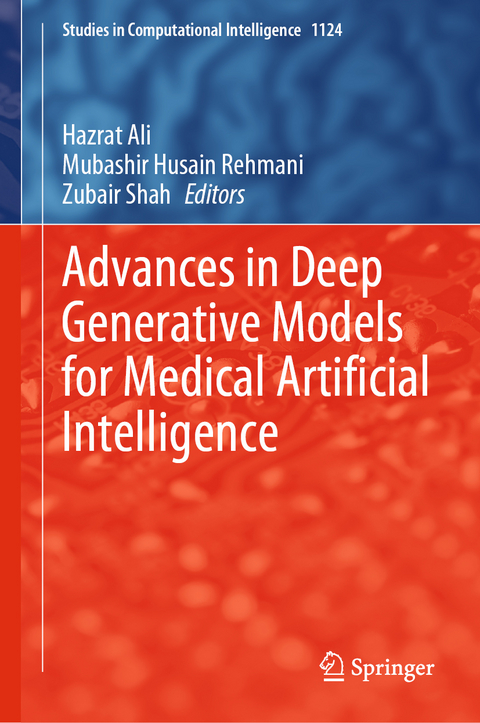
Advances in Deep Generative Models for Medical Artificial Intelligence
Springer International Publishing (Verlag)
978-3-031-46340-2 (ISBN)
Generative Artificial Intelligence is rapidly advancing with many state-of-the-art performances on computer vision, speech processing, and natural language processing tasks. Generative adversarial networks and neural diffusion models can generate high-quality synthetic images of human faces, artworks, and coherent essays on different topics. Generative models are also transforming Medical Artificial Intelligence, given their potential to learn complex features from medical imaging and healthcare data. Hence, computer-aided diagnosis and healthcare are benefiting from Medical Artificial Intelligence and Generative Artificial Intelligence.
This book presents the recent advances in generative models for Medical Artificial Intelligence. It covers many applications of generative models for medical image data, including volumetric medical image segmentation, data augmentation, MRI reconstruction, and modeling of spatiotemporal medical data. This book highlights the recent advancements in Generative Artificial Intelligence for medical and healthcare applications, using medical imaging and clinical and electronic health records data. Furthermore, the book comprehensively presents the concepts and applications of deep learning-based artificial intelligence methods, such as generative adversarial networks, convolutional neural networks, and vision transformers. It also presents a quantitative and qualitative analysis of data augmentation and synthesis performances of Generative Artificial Intelligence models. This book is the result of the collaborative efforts and hard work of many minds who contributed to it and illuminated the vast landscape of Medical Artificial Intelligence. The book is suitable for reading by computer science researchers, medical professionals, healthcare informatics, and medical imaging researchers interested in understanding the potential of artificial intelligence in healthcare. It serves as a compass for navigating the artificial intelligence-driven healthcare landscape.Dr. Hazrat Ali (SM'21, AFHEA) is a researcher at Hamad Bin Khalifa University, Qatar. His research interests lie in Generative Artificial Intelligence, Medical Artificial Intelligence, medical imaging, and speech and image processing. He is a senior member of IEEE and an associate editor at IEEE Access and IET Signal Processing journals. He has served as a reviewer at Nature Scientific Reports, IEEE Transactions on Artificial Intelligence, IEEE Transactions on Neural Networks and Learning Systems, IEEE Transactions on Medical Imaging, Machine Learning for Health Symposium, IEEE IJCNN, and many other reputed journals and conferences. He has published more than 70 peer-reviewed conference and journal papers. He was selected as a young researcher at the 5th Heidelberg Laureate Forum, Heidelberg, Germany. He is the recipient of the 2021 best researcher award by COMSATS University, the HEC start-up research grant, the top 10 research pitch award by the University of Queensland, Australia, and HEC, and the Erasmus Mundus STRoNGTiES research grant.
Dr. Mubashir Husain Rehmani (M'14-SM'15, SFHEA) received the Ph.D. degree from the University Pierre and Marie Curie, Paris, France in 2011. He is currently working as a lecturer in the Department of Computer Science, Munster Technological University (MTU), Ireland. He is serving as an Area Editor of the IEEE Communications Surveys and Tutorials and IEEE Open Journal of Communications Society and Associate Editor for several top ranked journals. He is the recipient of the Highly Cited Researcher(TM) award thrice in 2020, 2021, and 2022 by Clarivate, USA. His performance in this context features in the TOP 1% by citations in the field of Computer Science and Cross Field in the Web of Science(TM) citation index. In Oct 2022, he received Science Foundation Ireland's CONNECT Centre's Education and Public Engagement (EPE) Award 2022. He is the recipient of several best paper awards. He has published 9 books, and more than 130 peer reviewed journal and conference articles. Dr. Zubair Shah is an assistant professor at the Division of ICT, College of Science and Engineering, Hamad Bin Khalifa University, Qatar, where he leads the health informatics research group. He received an M.S. degree in Computer System Engineering from Politecnico di Milano, Italy, and a Ph.D. degree from the University of New South Wales, Australia. He was a research fellow from 2017 to 2019 at the Australian Institute of Health Innovation, Macquarie University, Australia. His expertise is in the field of artificial intelligence and big data analytics and their application to health informatics. His research is focused on health informatics, particularly in relation to public health, using social media data (e.g., Twitter) and news sources to identify patterns indicative of population-level health. He has published his work in various A-tier international journals and conferences, including Nature Scientific Reports, IEEE Transactions on Big Data, and Journal of Medical Informatics.Deep Learning Techniques for 3D-Volumetric Segmentation of Biomedical Images.- Analysis of GAN-based Data Augmentation for GI-Tract Disease Classification.- Deep generative adversarial network-based MRI slices reconstruction and enhancement for Alzheimer's stages classification.- Evaluating the Quality and Diversity of DCGAN-based Generatively Synthesized Diabetic Retinopathy Imagery.- Deep Learning Approaches for End-to-End Modeling of Medical Spatiotemporal Data.- Skin Cancer Classification with Convolutional Deep Neural Networks and Vision Transformers using Transfer Learning.- A New CNN-Based Deep Learning Model Approach for Skin Cancer Detection and Classification.- Machine Learning Based Miscellaneous Objects Detection With Application to Cancer Images.- Advanced deep learning for heart sounds classification.
| Erscheinungsdatum | 19.12.2023 |
|---|---|
| Reihe/Serie | Studies in Computational Intelligence |
| Zusatzinfo | XVI, 248 p. 86 illus., 69 illus. in color. |
| Verlagsort | Cham |
| Sprache | englisch |
| Maße | 155 x 235 mm |
| Gewicht | 567 g |
| Themenwelt | Mathematik / Informatik ► Informatik ► Datenbanken |
| Informatik ► Theorie / Studium ► Künstliche Intelligenz / Robotik | |
| Medizin / Pharmazie ► Physiotherapie / Ergotherapie ► Orthopädie | |
| Technik | |
| Schlagworte | Artificial Intelligence • Cancer • Computational Intelligence • Covid-19 • Deep learning • Diagnosis • diffusion models • generative adversarial networks • Healthcare • Medical AI • Medical Imaging • Neural networks • prognosis • Segmentation |
| ISBN-10 | 3-031-46340-4 / 3031463404 |
| ISBN-13 | 978-3-031-46340-2 / 9783031463402 |
| Zustand | Neuware |
| Informationen gemäß Produktsicherheitsverordnung (GPSR) | |
| Haben Sie eine Frage zum Produkt? |
aus dem Bereich


